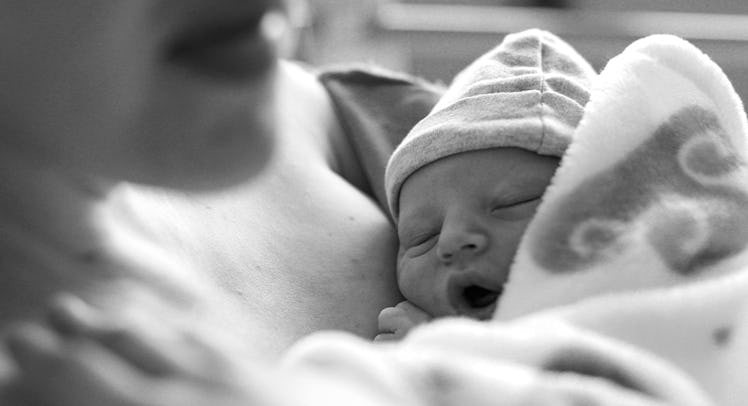A Day 1 Checklist For New Parents: What To Do With Your Baby
It's time to take baby home. Don't worry, you got this.

You researched, you practiced, you hired a coach, you took group lessons. And happily for everyone, the labor went great. So, now what? In most cases, if your partner gave birth in a hospital setting, your doctor and the staff will handle a lot of the heavy lifting for the first few hours after your baby is born. Expect your newborn to be weighed, measured, and given the Apgar test — a series of observations that assess a newborn’s general health. In the case of a normal childbirth, the first few hours will be spent getting to know your new family member and helping your partner with her first attempts at breastfeeding. The hospital may also do a Ballard score test, which includes measuring your infant’s head and chest circumference to help determine gestational age.
Depending on your hospital, it will soon be time to head home with your baby. Needless to say, that first day or two days can be overwhelming. “It’s a big unknown and the responsibility can suddenly hit you,” says Laura Jana, M.D., a pediatrician in Omaha, Nebraska, and author of Heading Home with Your Newborn. The good news: Despite the well-meaning advice from friends and your mother-in-law about all the million things you should be doing, what actual must-do checklist is short and very manageable. Follow these guidelines for what really matters the first day you bring baby home. Everything else is icing on the cake.
RELATED: How To Interact With Your Surprisingly Social Newborn
Newborn Baby Day 1 Checklist: Maximize Feeding Opportunities
“A lot of new parents are caught off-guard by the way their newborn will be interacting and engaging everyone one minute, and then deeply, soundly asleep the next,” says Dr. Jana. “It’s as if a switch is flipped.” That can throw things off when new parents are waiting for a baby to calm down a little before attempting to nurse, only to discover the infant is out cold. “I’d advise parents to try nursing as soon as the baby is awake,” says Dr. Jana. “It’s one of the most important things for you to focus on during this first day.”
While nursing itself is usually a mom’s task (for breastfed babies at least), you can do your part by going to get your baby if they are in a crib, and bring them to your partner. “Show your support in other ways, like asking her if she wants something to drink during this time, as it is common to feel dehydrated,” says Dr. Jana. After your child is done feeding, you can carry them back to their crib or gently rock them.
Newborn Baby Day 1 Checklist: Forget Routine
In these early days with your baby, there is no such thing as a regular schedule, and the harder you try to force one, the more stressed everyone will become. “Your best bet is to try and sleep when your baby does and wake when your baby does,” says Dr. Jana. “Everyone is tired during this time, and the easiest way to catch up on rest is to follow your baby rather than stick to some predetermined routine.”
Newborn Baby Day 1 Checklist: Watch for Pee and Poop
You have no idea how fixated on your baby’s bathroom habits you are about to become. Especially if during the first day or two, your infant doesn’t go to the bathroom at all. Don’t worry, says Dr. Jana. Despite what you’ve read in many parenting books, pee and poop don’t always happen right away. “A mother’s milk has to come in, and the baby has to master sucking, before he regularly pees and poops,” she explains. “The process can take three to five days, so don’t panic is he’s trying to nurse and you’re not getting action at the other end.”
Newborn Baby Day 1 Checklist: Get to Know Your Kid
Basically, the first 24 hours with your newborn are about eating, sleeping, and watching for pee and poop, says Dr. Jana: “When you distill it down to those three priorities, it can feel much more manageable.” So what should you focus on during the rest of the time? “Getting comfortable with your new baby is really important and often overlooked,” she says. “I’ll see new parents come in for a two-week checkup and they’re still struggling to put a onesie over their child’s head because they’re afraid they’re going to ‘break’ their baby. For some people it comes naturally, but for many, feeling confident takes time.” The only way to learn how to handle your infant is through practice. Start now, to help yourself become more confident in how to soothe, carry, cuddle, and comfort your baby.